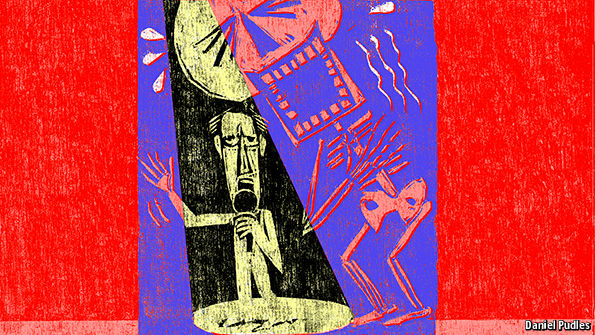
A Horse Walks into a Bar. By David Grossman. Translated by Jessica Cohen. Jonathan Cape; 197 pages; £14.99. To be published in America by Knopf in February 2017.
IN A shabby club in the Israeli city of Netanya, a diminutive, rake-thin, 57-year-old comedian takes the stage. Illness, death, war: all is fair game for a motor-mouthed provocateur whose onslaught of outrage draws his audience—aghast but spellbound—into an “alluring abyss”. Soon, though, the reader grasps that the masochistic Dovaleh is turning his whiplash tongue not so much on taboo topics as on himself—and on a retired judge, an old classmate summoned by the stand-up to the show, who recounts this story. Justice Lazar now fears that a shameful tale of teenage betrayals will come to light. Will Dovaleh put the judge himself in the dock?
In drama, film and fiction, comic turns usually bomb. But in his new novel, a monologue intercut with the judge’s memories, David Grossman, a fine Israeli writer, dares to turn the spotlight on a real, if ruinous, talent. Although an embittered, multiply divorced cancer survivor from a family blighted by the Holocaust, Dovaleh can elicit a “laugh of wonder at his precision, his subtlety, his theatrical wisdom”. The crowd, even the hecklers, become “partners in some sort of evasive, fluid transgression”.
It takes an author of Mr Grossman’s stature to channel not a failed stand-up but a shockingly effective one, and to give him salty, scabrous gags that—in Jessica Cohen’s savoury translation—raise a guilty laugh. Dovaleh’s edgy, “tightrope-walking” shtick narrows into a lacerating narrative of the cadet camp where, at 14, he learned of a parent’s death. The tortured judge’s own misery is compounded by the recent death of his wife. As the punters drift away, Mr Grossman unearths the twisted roots of both men’s self-disgust.
This book feels far removed from “Falling Out of Time”, the eerie elegy with which Mr Grossman in 2011 broke the silence of bereavement that had afflicted him when his soldier son Uri was killed in the war with Lebanon. Both works, however, circle around dramatic acts of mourning: the first as lyric tragedy, the second as pitch-black comedy. The lights dim, the club clears, but the pain and grief—which Dovaleh dubs “my own private Chernobyl”—still glow, still burn.
